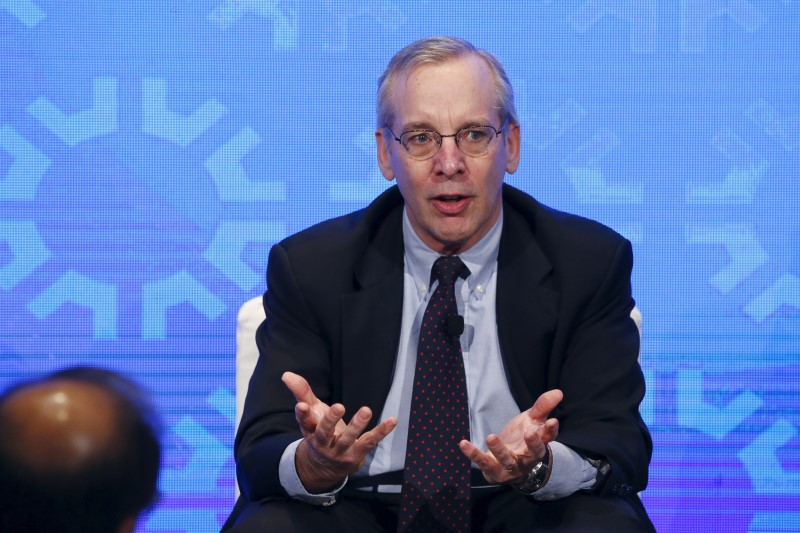By Richard Leong and Ann Saphir
SOMERSET, N.J./SAN FRANCISCO (Reuters) - As U.S. stock indexes dropped in volatile trading and oil crashed below $30 a barrel on Friday, Federal Reserve officials stuck to a well-worn script: day-to-day financial market swings do not drive monetary policy.
At the same time, the chiefs of two regional Fed banks signalled they are watching inflation closely and the potential impact of falling inflation expectations on monetary policy.
The influential chief of the New York Fed warned that slumping oil prices (CLc1) (LCOc1) and a strong dollar (DXY) have raised the risk of U.S. inflation expectations heading lower, hampering actual inflation from reaching the U.S. central bank's 2-percent goal.
"With respect to the risks to the inflation outlook, the most concerning is the possibility that inflation expectations become unanchored to the downside," New York Federal Reserve President William Dudley told the New Jersey Bankers Association.
Still, he said, "as long as the economy continues to grow at an above-trend pace, I expect the increase in resource utilization will be sufficient to push both inflation and inflation expectations higher over time."
LATER RATE HIKES?
The Fed raised U.S. policy rates for the first time in nearly a decade in December, and signalled they expect four rate hikes this year.
Traders are doubtful. They see the Fed raising rates only once this year, and not until June, based on trading in short-term interest-rate futures.
Global stock markets continued their 2016 nosedive on Friday as investors braced for a third straight week of losses sparked by worries over a slowdown in China's economy and the drop in oil prices.
Weak U.S. economic data added to the gloom, with falling December retail sales and industrial production suggesting economic growth braked sharply last quarter.
The Atlanta Fed said it now expects fourth-quarter U.S. gross domestic product growth of just 0.6 percent, well below the economy's long-run growth potential.
FED SHRUGS OFF MARKETS
But both Dudley and San Francisco Fed chief John Williams downplayed the effect of the stock-market decline on Friday.
"The short-term volatility is not something that worries me for monetary policy; it reflects market participants trying to make sense of global developments," Williams told reporters on Friday, adding that he sees no signs of distress or a weak economy in declining asset values, and is unsurprised that stock prices (SPX) would decline as the Fed raises rates.
"I think this year will probably be in many ways challenging around this issue: that market expectations may move around in ways that don't reflect actual expectations of the Fed," he said.
Though markets have all but ruled out a January rate hike, Williams refused to, saying he approaches every meeting with an open mind.
"The decision whether we raise rates in January, March, April, June or whatever, ... is not nearly as important for the economy as where the path of interest rates is going," Williams said.
While the Fed had early last year thought that low oil prices would spur more consumer spending, bigger-than-expected declines are fuelling concerns that inflation will remain stalled below the Fed's 2 percent target.
Williams said the dollar had strengthened more, and oil prices dove deeper, than he had expected, largely explaining the continued downward pressure on inflation.
Some surveys have pointed to a softening in inflation expectations, including the University of Michigan's measure of the long-term consumer inflation outlook which is near the bottom of its range in the past 20 years. Market-based measures of inflation expectations have also declined.

Despite concerns about disinflation, Dudley said he expects the U.S. economy to grow slightly above 2 percent in 2016 with a bit more tightening in the labour market.